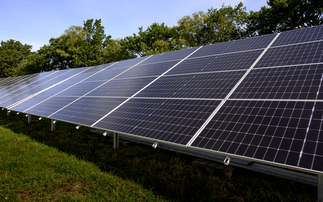Erna Solberg says governments must create predictable framework and a clear direction for low carbon investment
Erna Solberg, the Norwegian Prime Minister, has called on the world to immediately set a global carbon price and phase out fossil fuel subsidies in order to better drive investment in low carbon technologies.
Speaking at a conference hosted by the Norwegian British Chamber of Commerce in London today, Solberg argued Norway's 26 year old carbon tax had been crucial in helping to drive development of "climate friendly" technologies.
In what could be interpreted as a thinly veiled attack on the UK government's recent shake up of clean energy policies, Solberg said it was the job of governments to provide a stable policy framework to allow businesses to confidently invest in low carbon technologies.
She also argued that the global effort to tackle climate change required dugnad - a Norwegian term best translated as voluntary work best done through a joint effort.
"The active participation of business and industry will be crucial," she said. "The government should, and will, be a partner and active facilitator. But, as with a traditional dugnad, we all have different roles to play. In our view, the main role of the government in the green transition is to ensure a predictable framework and a level playing field for innovation, industry and enterprise. And, most importantly, to provide clear direction."
Solberg argued a carbon tax would prove a key mechanism in providing a stable investment environment for clean technologies and called for the United Nations to agree to a global carbon price at the Paris climate change summit next month.
While the Paris Summit could provide a boost to existing carbon markets and pave the way for a market mechanism for tackling emissions from emissions and shipping, a global carbon price agreement remains unlikely. However, growing numbers of political and business leaders, including a group of influential fossil fuel companies, have recently stepped up call for a global carbon pricing policy.
"Norway has had a carbon tax in place for a long time," Solberg said, rejecting the argument carbon pricing could damage economies. "This has not slowed down industrial development. Rather, it has encouraged innovation and the development of solutions that reduce emissions and bring down operating costs.
"On a global level, if there was ever a time when we should put a price on carbon emissions and phase out fossil fuel subsidies, it is now."
Despite Norway's ambitious action on climate change, the government has been criticised recently by campaigners for it's continued push to explore oil reserves in the Arctic.
In an open letter to Solberg published on Huffington Post this week, climate scientist James Hansen, warned that Norway's decision to award licenses in the Barents Sea could harm ecosystems most vulnerable to climate change.
"What Norway chooses to do in the Arctic can have a massive effect - for better or worse," he wrote. "We still have a small window of opportunity to avoid climate tipping points and stabilise the climate, but not if the race to exploit Arctic oil reserves continues unchecked."
This article is part of BusinessGreen' Road to Paris hub, hosted in association with PwC










